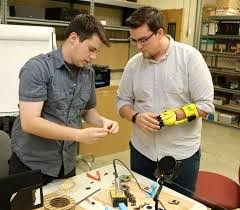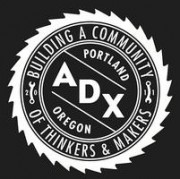Portland Made: Portland Community College’s Makerspace
Wednesday, August 05, 2015

Photo credit: pcc.edu
The Business of Making Dreams Real
MakerSpace was created in 2006 with the help of a grant from the National Science Foundation. It is a laboratory where students can work on coursework, but is also for making things from their own designs. This ability to experiment on small projects and to prototype ideas freely enables students to “fail forward versus fail backward,” says Instructor Gregg Meyer. In addition, because MakerSpace is an open drop-in lab, there is plenty of opportunity for brainstorming and peer mentoring. The tag line for MakerSpace is “Design. Make. Play.” Having fun as a motivator, rather than a test, is proving to supply students with a fast learning curve.
“We’re in the business of making dreams real,” says Meyer. They are expanding this idea into high schools, especially those that don’t teach mechanics but have technical labs and programs. Students are able to get dual credits – meeting their high school graduating requirements and giving them college credits also. They have put on intensive one-day workshops specifically for high school girls, exposing them to several additive-manufacturing processes; at the end of the day each girl is able to leave with a tangible object they have created themselves. This has proved to be incredibly encouraging and empowering, as girls learn that they can be successful in a field that has been largely male-dominated.
Future Plans
Kraft and Meyer have enthusiastic plans for the future, for extending the reach of programs like MakerSpace. They would like to eventually be able to offer Small Business Development to students who want to be independent manufacturers. They could get a degree while developing and prototyping their design/manufacturing idea; learn how to create a business plan, obtain a provisional patent for their design and explore options for revenue generation. By graduation, they will not only have access to a career, but also potentially a small business of their own.
They would also like to eventually create an “Exploring Engineering” class into high schools by developing a teacher training and certification program. The idea would be to then supply the teachers with a “maker cart” of supplies, including a 3D printer to enable real life, hands-on learning for high school students.
But why stop there? Kraft and Meyer are pondering the question, “how do you get this down to the first, second or third grade?” Stay tuned. The future has just begun.

Portland Made is a digital storytelling platform and advocacy center for Portland's Maker Movement. We do 2 features a month on Portland Makers; connect makers with more local, national and international markets; connect makers with local professional and manufacturing resources; advocate for makers with politicians at all levels of government; work with PSU on an annual survey that captures the economic power of the Maker Movement; help makers find real estate; and promote Portland makers with local and national media.

Related Articles
- Portland Made: Save the Central Eastside
- Portland Made: Product Innovator, Sam Pardue of Indow
- Portland Made: Spooltown Soft Goods Factory
- Portland Made: Straight Razor Maker Scott Miyako
- Portland Made: Zenger Farms, Growing the Next Generation of Farmers
- Portland Made: Woodworker Josh Mabry
- Portland Made: Oregon Kombucha Starter Kit
- Portland Made: Leather Craftsman Geoff Franklin
- Portland Made Retail: Tender Loving Empire




Follow us on Pinterest Google + Facebook Twitter See It Read It